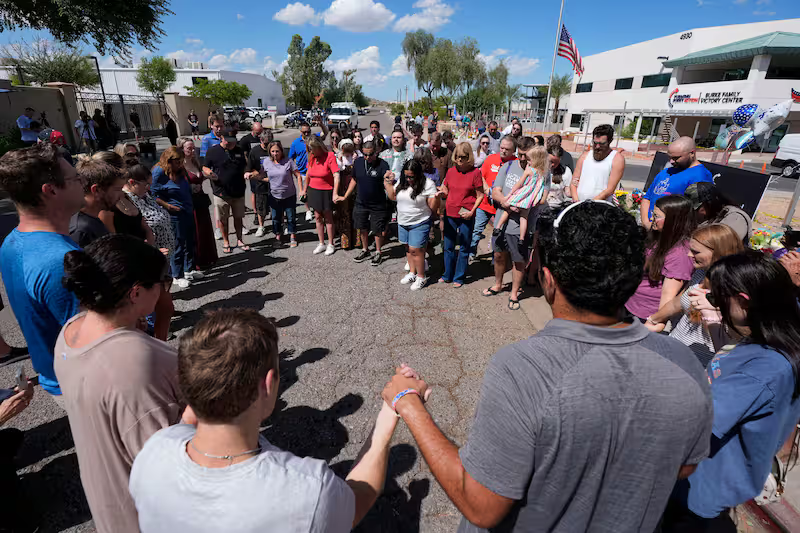"Good men must die, but death can’t kill their names." - Charlie Kirk
Tyler Robinson, 22, climbed to a rooftop at Utah Valley University with a scoped rifle and bullets etched in mockery. As Charlie Kirk spoke on stage below, the shooter fired a single round. In the seconds that followed, a man who built his career on confrontation through words was silenced by violence. The suspect did not walk back through the stairwell. He leapt down, left palm and footwear impressions, and fled into a wooded neighborhood. He had changed clothes mid-flight. He wrapped the rifle in a towel and stashed it in the bushes, a tactic that echoed planning notes investigators later recovered. Surveillance cameras pieced together his path, and that footage would lead to his father coming to the realization that his son was the suspect of the manhunt for Kirk's killer.
Less than two days later, the suspect confessed at home and threatened to kill himself. His father brought him to a youth pastor employed by the Washington County Sheriff’s Office, who immediately alerted authorities. Utah’s governor confirmed what court documents later showed: a family friend told police the suspect had “confessed to them or implied he had committed the incident.” Within hours, law enforcement moved in and made the arrest.
Among the evidence were engraved shell casings mixing taunts, memes, and overt anti-fascist references. One read “Hey, fascist! Catch!” with the arrow sequence ↑ → ↓ ↓ ↓—the exact Helldivers II input for the Eagle 500kg Bomb. Another carried “Bella ciao,” the Italian anti-fascist song linked to the Resistance and now used globally at anti-fascist and protest events; it has also circulated in recent pop culture. To casual eyes the engravings looked like nonsense. To those steeped in these subcultures, they read as signals—digital in-jokes and movement symbols repurposed as marks of violence.
The path to that moment was marked by signs of growing obsession. Friends described him as the “only leftist” in a conservative family, someone who by high school had grown combative, ranting endlessly about politics. Authorities allege the shooter discussed on Discord, detailed plans for rifle drops, outfit changes, and the very engravings investigators would later find at the scene. Scrawled among them was the phrase, “If you read this, you are gay, LMAO”—mockery wrapped around premeditation. A sign to many that this young man may have been radicalized by the algorithms that claim to protect us.
This is not the first time Discord has been accused of serving as a staging ground for violence. After the 2022 Buffalo massacre, investigators revealed the shooter had maintained a private diary on the platform, outlining his plans in detail before sharing access to others shortly before the attack. Discord confirmed the account’s existence and said it cooperated with law enforcement, but sidestepped questions about whether it could have detected the writings sooner. In the Robinson case, officials pointed to Discord activity as evidence of planning. The company, however, pushed back, saying the disputed messages were not written by Robinson himself but came from a roommate’s notes.
As people online argued over what the shooter’s words meant and who should be held accountable, the reality on the ground was different. The grieving had already begun. Friends, staff, and strangers were left trying to put into words what had been lost.
Turning Point USA released a video tribute interlacing Kirk’s campus confrontations with private family moments. His widow Erika reminded supporters of the side few ever saw: “I know a lot of you have seen his videos on TikTok and all the stuff he does on campus, but no one gets to see him from my angle, except for myself and our children.” The reminder was piercing — behind the stage lights and political fights was a father, a husband, and a man who came home every night to a family that adored him.
Staffers described him as more than a boss — a brother who believed in them when they didn’t believe in themselves. A photographer wrote, “I didn’t know I would be mic’ing you up for the last time today. You made a profound impact in millions of lives.” The Daily Wire recirculated his words as epitaphs: “Jesus defeated death so you can live.” “God, family, country. In that order.” “Good men must die, but death can’t kill their names.”

Turning Point USA shared a video tribute mixing fiery campus debates with quiet family moments. His widow Erika offered a voice of aching intimacy: “I know a lot of you have seen his videos on TikTok and all the stuff he does on campus, but no one gets to see him from my angle, except for myself and our children.” The reminder struck hard — beyond the spotlight, he was husband and father, loved at home before he was ever known on stage.
The grief spilled past American borders. In London, supporters draped Union flags across statues and lit candles beneath them. In Berlin, students gathered on the steps of Humboldt University with signs quoting his words. In Nairobi, a small chapel filled with hymns sung for a man few had met but many had followed. In São Paulo, a banner stretched across a plaza read simply: “God. Family. Country.” In South Africa, mourners raised their national flag beside his image, calling him a martyr for freedom.
At home, flowers piled outside TPUSA headquarters, candles flickered on campuses, and flags dropped to half-staff. The grief was raw and unfiltered, carried from Phoenix to Pretoria, London to Lagos. In those vigils and prayers came the painful realization: the man who taught them to argue — fiercely, relentlessly, unapologetically — was gone, not by words but by a bullet.
And then came his wife’s voice. Erika Kirk spoke for the first time since the shooting, thanking law enforcement and first responders, the Turning Point staff, and the millions of supporters who poured out love from Phoenix to cities across the world. She remembered her husband as a man of faith and family, who asked her every day how he could be a better husband and father. She spoke of his joy in raising their children, his love for America, and his unshakable belief in God’s mercy.
But her words carried more than grief. They carried defiance. “If you thought that my husband’s mission was powerful before, you have no idea what you have unleashed,” she told the audience. “The cries of this widow will echo around the world like a battlecry. No one will ever forget my husband’s name.” She vowed that the tours would continue, the show would go on, and the movement he built would not die.

Kirk built his reputation on walking into hostile crowds on college campuses, insisting that ideas must be tested against opposition. His purpose was never consensus but confrontation — without violence. That a man committed to dialogue was silenced by a rifle says less about him than it does about the culture that allowed it. Utah’s governor, Spencer Cox, stood before cameras and admitted he had never been so angry or so heartbroken. But he reached for Kirk’s own words to steady himself, telling young people across the country: “When people stop talking, that’s when you get violence.” Cox reminded them of Kirk’s warnings that “internet fury is not real life” and that forgiveness, even of enemies, is the only antidote to rage. “You are inheriting a country where politics feels like rage,” Cox said. “But through those words, we have a reminder that we can choose a different path.”
The suspect didn’t leave behind a manifesto. He left pieces — memes, taunts, and irony sharpened into weapons. He turned disagreement into spectacle. What remains is not a coherent ideology but fragments of mockery, and a community mourning the principle he targeted. What he struck was not just Charlie Kirk, but the fragile belief that in America, arguments should still be settled with words, not bullets.
Kirk’s own words survive him. “When things are moving very fast and people are losing their minds, it’s important to stay grounded. Turn off your phone, read scripture, spend time with friends, and remember internet fury is not real life. It’s going to be ok.”
A man who stood for free debate is gone, and many on the internet have celebrated his death. If bullets become our answer to words, we are not debating anymore—we are dismantling the very foundation of what our nation stands for. Disagreement is survivable. Debate is survivable. Violence is not.
To celebrate his murder is to celebrate the death of discourse itself. And if open discourse fails, democracy itself fails.
In The Free Press editorial Je Suis Charlie Kirk, editors wrote that Kirk was not just a conservative firebrand, but a flesh-and-blood embodiment of free expression — the very foundation of this experiment called America. He stood on college stages to invite debate, not to ignite violence, and in his death, the republic lost more than a man—it lost a reminder of democracy’s promise.
As The Free Press put it:
“He was murdered while practicing the very act that gave birth to this nation—and the only thing that will ensure its survival.”
That is the final reckoning. Not a political tragedy, but a civic one. He stood for speech. And in the moment that silence fell, America has to decide: will we choose dialogue, or will we stop talking?





